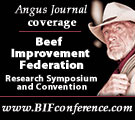Seek Veterinary Consultant
Play offense rather than defense by using your veterinarian as a consultant to prevent problems rather than as an emergency technician.
It pays to have a working relationship with a veterinarian to assist in a herd health management strategy and preventative medicine, rather than relying on a veterinarian to solve emergencies. The veterinarian can answer questions and help prevent problems, often increasing the rancher’s profit margin.
John Hall, extension beef specialist for the University of Idaho, says arranging for a veterinarian to be a consultant offers cattlemen several advantages.
“This gives the veterinarian a chance to help the producer look over the entire operation in terms of herd health. Together they can find any weak areas and identify places for improvement. The veterinarian may suggest some changes, and perhaps help the producer get connected with other professionals, such as a nutritionist or extension agent, or even a person from the NRCS (Natural Resources Conservation Service) if there’s a water problem, or some fencing and water issues,” Hall says. Every operation is different, and there may be unique factors that should be addressed.
It also helps if the rancher and veterinarian can get together with a nutritionist regarding the overall health program. Nutrition affects everything else — such as fertility and the immune system. Well-fed animals tend to be healthy animals.
The rancher should consult with the veterinarian once or twice a year and discuss any problems experienced that year, or ask about new vaccines (to know which ones he/she should be using). There’s not much difference in vaccines, but it is important to make sure you are using a vaccine that matches your management, production or health maintenance program.
By utilizing the veterinarian as a consultant, you can stay ahead of what’s happening, rather than dealing with emergencies as they happen. The veterinarian is also aware of new products that might be helpful in the operation. If there is a change in vaccines or dewormers, the veterinarian can make recommendations.
“One of the big problems is fly control. It’s tough to stay ahead of resistant flies. Veterinarians are keyed into this, and know what you might be able to use,” says Hall.
There is a shortage of large-animal veterinarians in many parts of the United States, and it’s not always easy to find one when you need one.
“It’s a fact of life that the vet has to feed and clothe his/her family 365 days of the year, just like we all do. One way he/she can do that is to charge a high fee every time you have an emergency. The other way he/she can do that is by helping you increase your profit margin by having you pay for his/her expertise in certain areas — and maybe prevent catastrophes,” says Hall.
“If you save a few more calves, or get three more cows bred, you can afford that consultation. Putting the veterinarian into a partnership role can pay off,” he emphasizes. “It’s hard for producers to become educated about health issues when the only opportunity is during an emergency. It’s hard for the veterinarian to concentrate on anything else, other than ‘putting out the fire’ and dealing with the emergency. The producer wants to know how to prevent this happening to the next cow or calf. During times of year when things are a little slow for both of you, you can get together and look over things.”
You can see what kinds of problems you had last year, he adds, and what you might do differently.
“It’s always good to have someone else look at your cattle,” he says. When you are looking at them (or your operation) every day, you become accustomed to how things look and might not notice something an impartial observer might see. If the veterinarian is out there periodically and familiar with the farm/ranch, he/she may be able to see changes.

Editor’s Note: Heather Smith Thomas is a freelance writer and cattlewoman from Salmon, Idaho.






